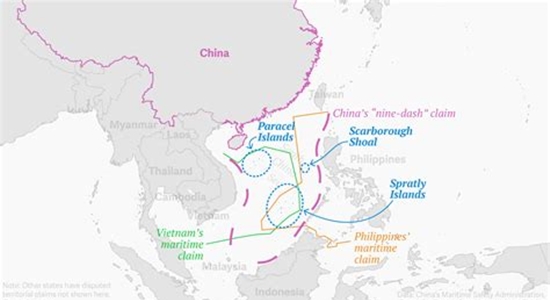
An Indonesian exploratory mission in the Natuna Sea was recently and repeatedly interrupted when a Chinese Coast Guard showed up—1,500 kilometers from China and within Indonesia’s exclusive economic zone—and had to be repeatedly driven away by Indonesian vessels.
Although Chinese altercations with Indonesia in the South China Sea have been relatively rare, the incident follows similar Chinese Coast Guard bullying of the vessels of the Philippines, Vietnam, and other countries.
The Chinese claim to sovereignty over most of the South China Sea has been rejected by the Permanent Court of Arbitration, an internationally recognized body.
A dashed line
The Natuna Sea lies south of Vietnam and north of Borneo to the east and Singapore to the west. The Indonesian EEZ lies just northward into the sea between the Malaysian territory. The incident reminds us of how big the Nine-Dash Line—representing China’s expansive claim over almost all of the South China Sea—really is. The line proceeds south of Taiwan, through Philippine waters, all the way down off the coast of Malaysia (the island of Borneo) to the Natuna Sea and then back northward into Vietnamese waters.
The Associated Press reports that it is not unusual for Chinese ships to operate in the area. The ship that was driven off had taken the place of another Chinese ship lurking nearby.
According to Ray Powell, director of the SeaLight project, the purpose of the harassment may have been to test how forcefully the new Indonesian government would respond when provoked. The Indonesian government may feel obliged to temper its response to such intrusions in light of its economic interest in keeping the peace with China.
Apco notes that China looms large in Indonesia’s economic picture, being its “largest trading partner and a major source of greenfield and infrastructure investment. In 2023, the total value of Indonesia’s trade with China reached USD 139 billion. Chinese investment in Indonesia totaled USD 7.4 billion, making China the country’s second-largest foreign investor after Singapore.”
Resistance not futile
Indonesia has signed up for China’s Belt and Road Initiative and may believe that it needs China’s investments if it is to hit the growth targets set by Indonesia’s new president, Prabowo Subianto. “Prabowo aims to raise Indonesia’s economic growth rate to 8% during his first term. To do this, he will likely look to build on the foundations of Chinese capital for infrastructure and resource development.”
The Natuna Sea incident manifests a consistent motive in China’s actions: seeing how much it can get away with. Knowing that Indonesia is tethered by existing relationships of trade and investment, China will exploit this tether to promote its own interest even to the point of violating a partner’s sovereignty.
Although officially nonaligned, Indonesia can improve its position by standing with other countries threatened by China’s nine-dash-line claim and by seeking greater relations of trade and investment with the West. The more China is allowed to impose its will in the South China Sea and bully its neighbors, the harder it will be to resist this bullying.
Also see:
Council on Geostrategy: “The South China Sea: Historical and legal background”





